Overview
Starting a contracting business can feel overwhelming, and you might be wondering where to begin. We understand that identifying your niche, establishing a legal framework, and conducting thorough market research are essential steps. These foundational actions not only help you understand local demand and competition but also set the stage for your success.
However, it’s important to remember that you’re not alone in this journey. Many entrepreneurs face similar challenges, and the emotional impact can be significant. By embracing strategic financial planning and effective marketing, you can position your new contracting venture for success in a competitive landscape.
Imagine the sense of achievement you’ll feel as you navigate these steps. With the right support and knowledge, you can turn your aspirations into reality. Let’s take this journey together, ensuring that each step is a move toward your career ownership.
Introduction
In the competitive world of contracting, we understand that launching a successful business requires more than just technical skills; it demands strategic planning and a keen understanding of market dynamics. As aspiring contractors navigate the complexities of this industry, you are not alone in feeling overwhelmed. Identifying your niche, developing a solid business structure, and engaging in comprehensive market research are essential steps to position yourself effectively.
With the construction landscape continuously evolving, embracing innovative marketing strategies and maintaining compliance with legal requirements are crucial for your sustainability and growth.
This article outlines essential steps and expert insights to empower you, helping you turn your ambitions into a thriving business that meets the needs of today’s market.
Essential Steps to Launch Your Contracting Business
-
Identify Your Niche: As you embark on this journey, it’s crucial to pinpoint the specific area of work that aligns with your skills and the market demand. Whether it’s residential, commercial, or specialized trades like plumbing or electrical work, your choice matters. In fact, in 2025, many new contractors are expected to focus on residential projects, reflecting a growing trend in this sector. As Kruttika Dwivedi, research manager at Deloitte, emphasizes, identifying a niche is essential for success in the industry. It allows you to customize your services and marketing approaches effectively, ensuring that you stand out in a competitive field.
-
Establish a Contracting Framework: Selecting the right legal structure for your contracting venture is another vital step. You may consider options such as sole proprietorship, limited liability company (LLC), or corporation. Each structure carries distinct legal and tax implications, so it’s essential to evaluate which one best suits your objectives and risk tolerance. Consulting with a legal expert can provide clarity on the best choice for your situation, helping you feel more confident as you move forward.
-
Develop a Business Name: Choosing a memorable name that encapsulates your services and resonates with your target audience is key. Ensure that the name is unique by checking local enterprise registries to avoid potential legal issues. A powerful company name can significantly enhance your brand identity and attract clients.
-
Register Your Company: Completing the necessary paperwork to legally register your company with local and state authorities is essential. This step establishes your enterprise as a legitimate entity and may involve obtaining specific licenses or permits depending on your niche.
-
Establish a Financial Account: Opening a dedicated bank account for your freelance work is a wise move. It maintains a clear separation between personal and professional finances, simplifying accounting and enhancing your professional image. Additionally, consider utilizing self-funding mechanisms through checking and savings accounts to manage your initial expenses effectively. This approach can offer you the financial flexibility required to invest in your venture without relying solely on external funding sources.
As you take these foundational steps, remember that you are not alone. Industry experts emphasize the importance of niche identification in contracting. By concentrating on a specific area, you can better position your venture for success in a competitive market. Staying informed about trends, like the increasing adoption of modular and prefabricated construction methods—which can lead to project completion times that are up to 50% faster—can provide you with a significant advantage.
Furthermore, new firms should be aware of current challenges in the industry, including labor mismatches and the necessity for technological integration, as highlighted in recent news. With these foundational steps, you can effectively learn how to start a contracting business and manage it successfully, supported by the personalized coaching and resources offered by Find Your Career 2.0 | Career Ownership Coach Parnell Woodard. This program has a proven track record of helping individuals transition into new career paths, providing the support you need to thrive.
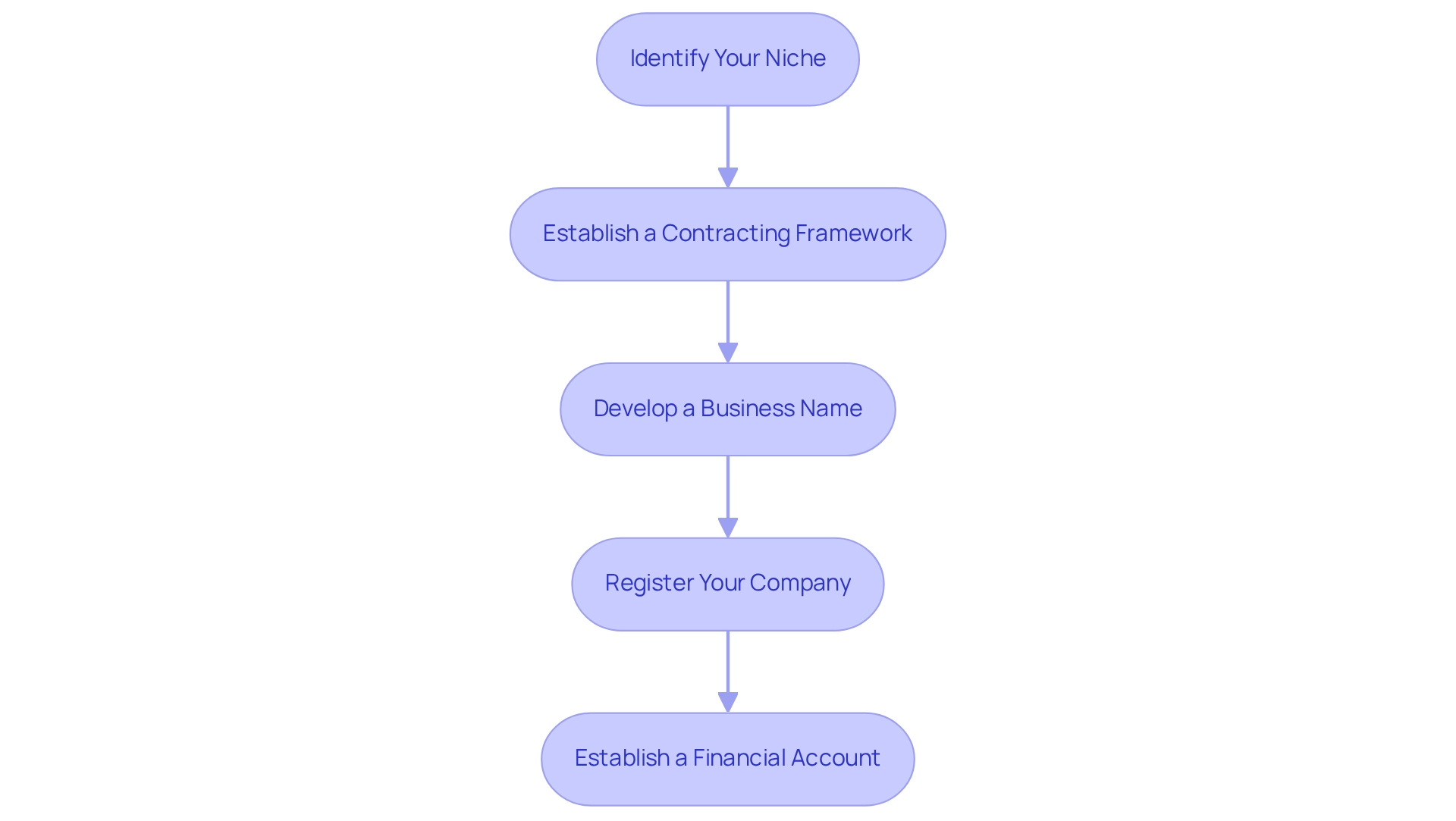
Conducting Market Research: Understanding Your Local Landscape
-
Identify Your Target Market: We understand that defining your ideal customers can feel overwhelming. Start by considering key demographics like age, income level, and homeownership status. Think about their geographic location and specific needs, as these factors will significantly shape your marketing strategies. In 2025, grasping customer preferences is more important than ever; for example, there is a growing demand for sustainable and energy-efficient solutions. This reflects a broader shift towards Environmental, Social, and Governance (ESG) principles in the construction industry. Notably, 54% of construction leaders are embracing these ESG principles, highlighting the importance of aligning your services with these trends to attract environmentally conscious clients.
-
Analyze Competitors: It can be daunting to navigate the competitive landscape. Conduct thorough research on existing contractors in your area. Look at their service offerings, pricing structures, and customer feedback to identify gaps in the industry. With 66% of individuals feeling optimistic about the construction sector, there is a ripe opportunity for new entrants who can stand out with unique value propositions or specialized services. This optimism is a beacon for career transitioners eager to establish themselves in a thriving market.
-
Gather Data: Collecting data on customer preferences and industry trends can feel like a monumental task, but it’s essential. Utilize various methods such as surveys and interviews to gain direct insights from potential clients, while online resources and industry reports can provide valuable context. For instance, 23% of firms are now adopting offsite prefabrication and lean construction techniques, signaling a shift in operational preferences that could inform your service offerings. Additionally, the competitive landscape for home services marketing shows that many companies are investing heavily in digital strategies, with costs per click on Google Ads exceeding $40. This underscores the necessity for new entrepreneurs to focus on online marketing as a means to effectively acquire customers.
-
Evaluate Demand: Assessing the demand for your services may seem daunting, but it’s crucial. Take a close look at local construction projects and relevant economic indicators. Understanding local economic dynamics is essential; for instance, as construction leaders increasingly adopt innovative practices like Building Information Modeling (BIM), the need for contractors who can deliver these advanced solutions is growing. By staying informed about these trends, you can position your enterprise to meet the evolving needs of your target market effectively. As Kruttika Dwivedi from Deloitte observes, grasping the future of work and talent management is essential for adjusting to these changes, offering valuable insights for career transitioners entering the freelance sector.
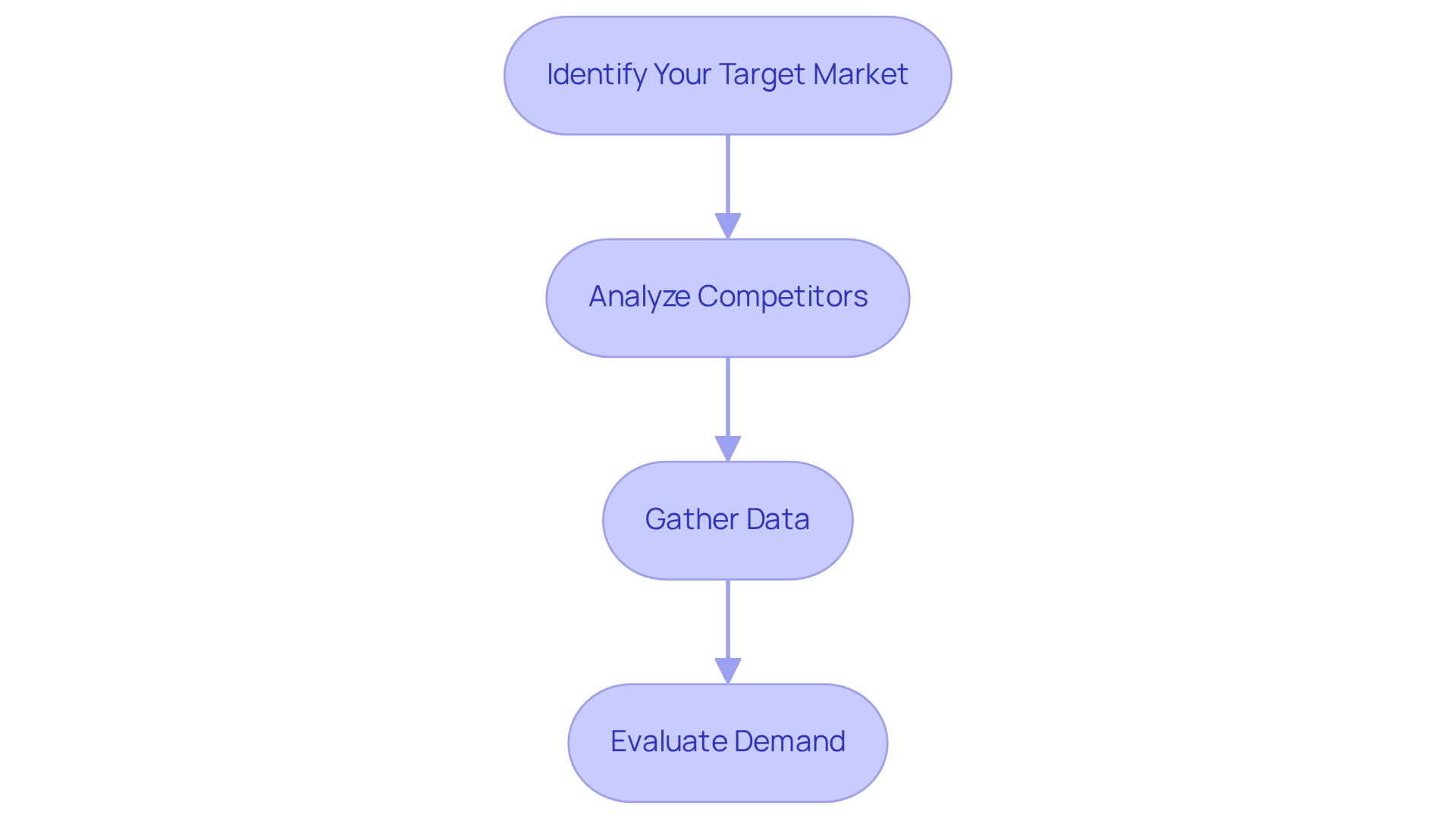
Crafting a Comprehensive Business Plan for Success
-
Executive Summary: Begin with a heartfelt summary of your enterprise, sharing your mission statement and the unique services you provide. This section sets the tone for your plan, highlighting your distinctive value and the goals you aim to achieve. At The Entrepreneur’s Source, we offer personalized coaching and resources to help you navigate the complexities of starting a contracting business, empowering you to take control of your professional future.
-
Industry Assessment: We understand that conducting a thorough industry assessment is crucial for grasping your target demographics and the competitive landscape. Research shows that effective analysis is essential for contractors, informing strategic choices and helping to recognize growth opportunities. Companies that invest time in understanding their industry are significantly more likely to thrive, with a 260% greater probability of launching successfully compared to those that do not.
-
Marketing Strategy: Craft a robust marketing strategy that outlines how you will attract and retain customers. This should encompass pricing strategies, promotional activities, and sales tactics tailored to your target market. Given the current trend towards remote and hybrid work, leveraging digital marketing and virtual collaboration platforms can enhance your outreach and engagement with potential clients.
-
Financial Projections: It’s important to provide detailed financial forecasts, including startup costs, revenue projections, and break-even analysis. Precise financial forecasts are vital for new enterprises, as they help assess the viability of your venture. Research indicates that companies with organized financial strategies are more inclined to achieve significant growth, enjoying a 7% higher chance of success.
-
Operational Plan: Outline the daily operations of your enterprise, detailing staffing requirements, necessary equipment, and workflow processes. A clear operational plan ensures efficient resource management and quality service delivery to your clients. As technology continues to advance within the construction industry, integrating data and advanced analytics into your operations will be essential for future success. Consider Tesla’s hyper-automation approach, which has reduced production costs per vehicle by 30% and increased production efficiency by 40%. This illustrates how technology can enhance operational effectiveness, paving the way for your success.
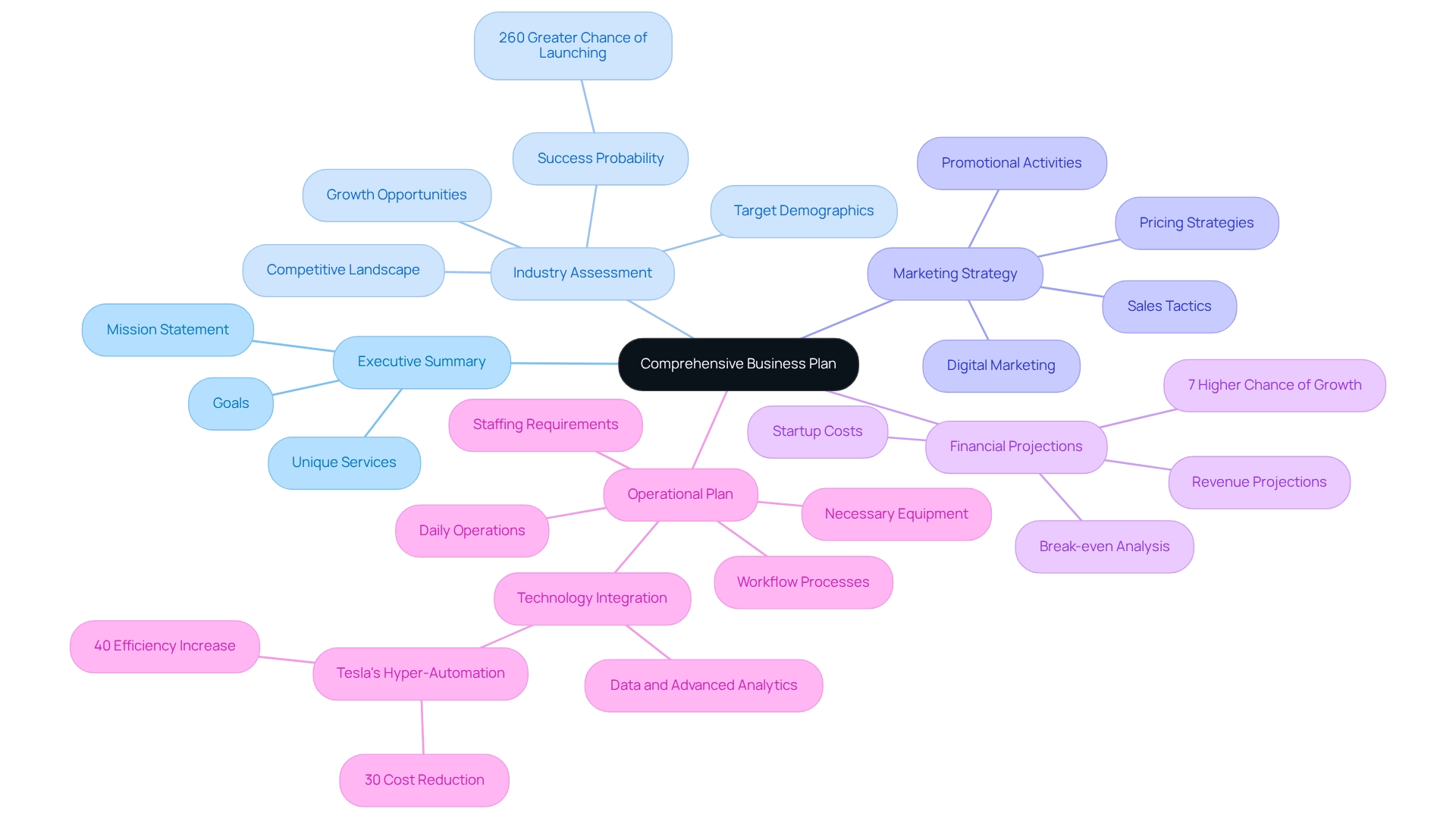
Navigating Licenses and Permits: Legal Requirements for Contractors
-
Starting a contracting business can feel overwhelming, but you’re not alone. Begin by researching local requirements and consulting your local government’s resources to identify the specific licenses and permits necessary for your contracting operations. Each state has unique regulations, and understanding these is crucial for compliance. For instance, in Louisiana, a home improvement registration is mandatory for projects valued between $7,500 and $75,000 if you do not hold a residential or commercial license. This process involves several steps, including submitting notarized financial statements and proof of insurance, but with patience, you can navigate it successfully.
-
Obtain Necessary Licenses: Once you have a clear understanding of the requirements, it’s time to take the next step and apply for the necessary licenses. This may include a general builder’s license, specialty licenses, or specific business permits. In Mississippi, for instance, builders must secure a state license for projects surpassing $50,000, which entails passing exams and showcasing relevant experience. Successfully navigating these licensing processes is crucial when learning how to start a contracting business, as it ensures compliance and enhances your credibility in the industry. Remember, a contractor who successfully navigated this process once shared that understanding local regulations was key to their success.
-
Insurance and Bonding: Protecting your enterprise and clients is essential. Safeguard your business by obtaining liability coverage, and consider securing a surety bond, which can be a requirement in many jurisdictions. This not only protects your business against potential claims but also instills confidence in your clients regarding your professionalism and reliability. As of 2025, the handyperson exemption will increase to $1,000, highlighting the importance of understanding insurance thresholds in your area. As Tom Scalisi, a writer devoted to educating builders, observes, understanding how to start a contracting business includes comprehending the nuances of insurance and bonding, which can significantly influence a builder’s reputation.
-
Stay Updated: The regulatory environment for builders can change frequently, and we understand how challenging it can be to keep up. Regularly review local regulations to ensure that you remain compliant with any updates in licensing requirements. This proactive strategy will assist you in avoiding potential legal problems and preserving your organization’s good standing. Engaging with industry experts and resources can provide valuable insights into best practices and emerging trends in licensing and permits, empowering you to stay ahead in your journey.
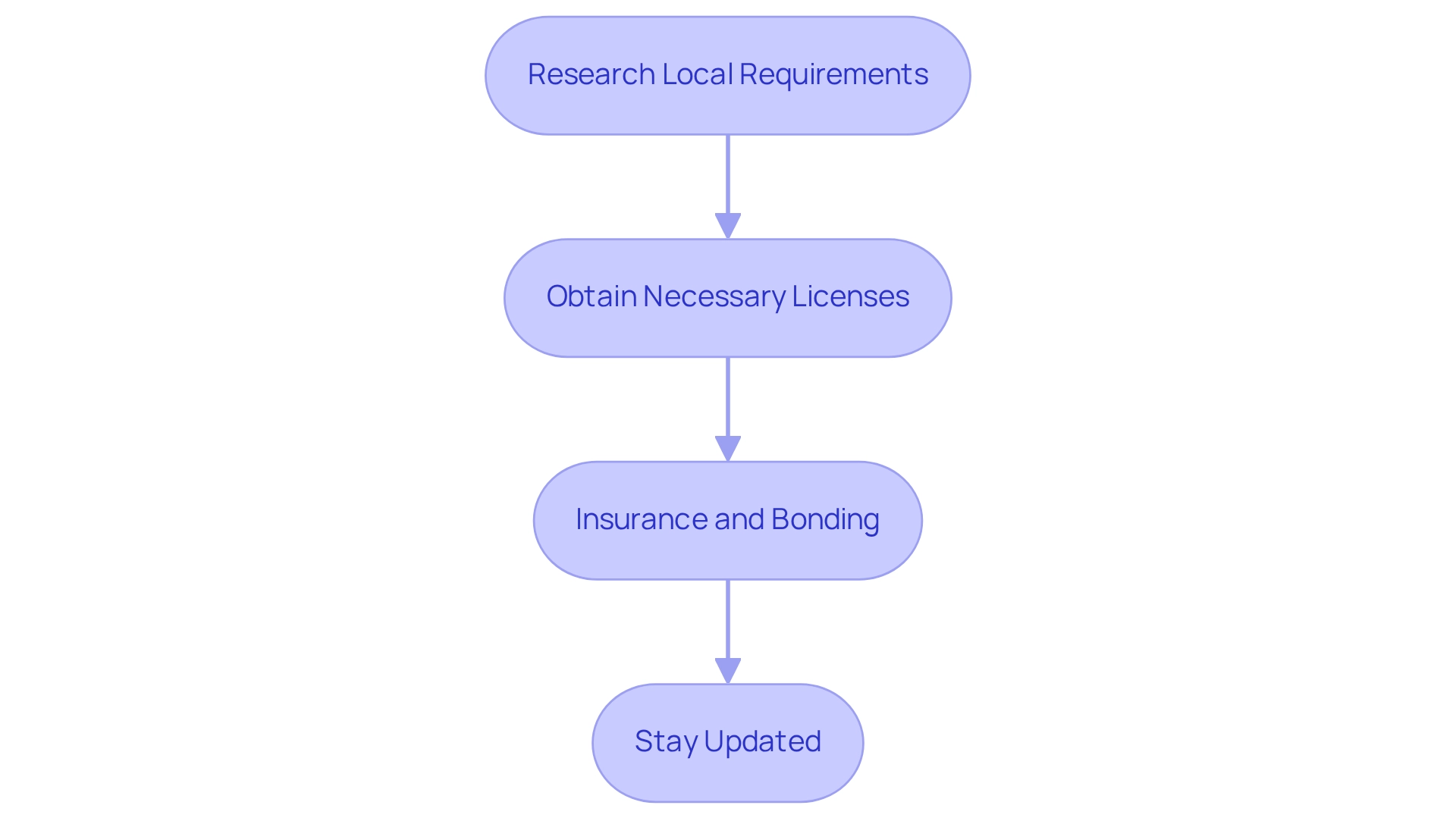
Securing Funding and Managing Finances Effectively
-
Identify Funding Sources: Starting a new venture can feel overwhelming, but exploring various funding options can help ease that burden. Many new vendors turn to personal savings, bank loans, grants, and investments from family or friends as common avenues for support. In 2025, numerous new builders are finding hope in alternative funding sources, such as crowdfunding and angel investors, to secure the necessary capital. It’s worth noting that approximately 30% of new workers utilize personal savings, while 25% rely on bank loans, highlighting the diverse funding landscape available. In light of the declining career economy and limited conventional job options, it’s crucial for freelancers to take charge of their financial destiny. The construction industry, which provides jobs to over 100 million people worldwide and accounts for about 6% of GDP, presents significant opportunities for new contractors eager to build wealth and equity.
-
Create a Budget: Crafting a detailed budget is a vital step for any new enterprise, and it can feel daunting. This budget should outline expected income and expenses, including startup costs—such as equipment, licensing, and insurance—and ongoing operational expenses like payroll and materials. Experts agree that a well-structured budget can significantly enhance financial stability and decision-making. As the construction industry evolves, adapting budgeting strategies to reflect changing market dynamics becomes essential for mitigating risks and achieving the financial freedom you deserve.
-
Monitoring cash flow is crucial for understanding how to start a contracting business sustainably. Establishing a strong system for tracking income and expenses empowers professionals to foresee financial difficulties and make informed choices. Regular cash flow analysis can help identify trends and areas for improvement, ensuring that your business remains solvent. The Deloitte analysis titled “Optimism for 2025 in Construction” emphasizes the importance of managing labor mismatches and increasing technological integration, which can impact cash flow management. By concentrating on cash flow, builders can better navigate how to start a contracting business while effectively managing the unpredictabilities of a challenging job market.
-
Financial Tools: Utilizing accounting software is essential for effective financial management, and it can simplify your journey. These tools not only streamline bookkeeping but also assist in preparing for tax obligations. In 2025, the incorporation of data analytics into financial management is becoming increasingly significant, allowing professionals to make data-driven choices that enhance profitability and operational efficiency. As Parnell Woodard, a Career Ownership Coach, states, “Transitioning to career ownership empowers individuals to achieve their career goals,” emphasizing the support available for new professionals navigating this evolving landscape. This empowerment is crucial for fostering community engagement and discovering new possibilities beyond current experiences.
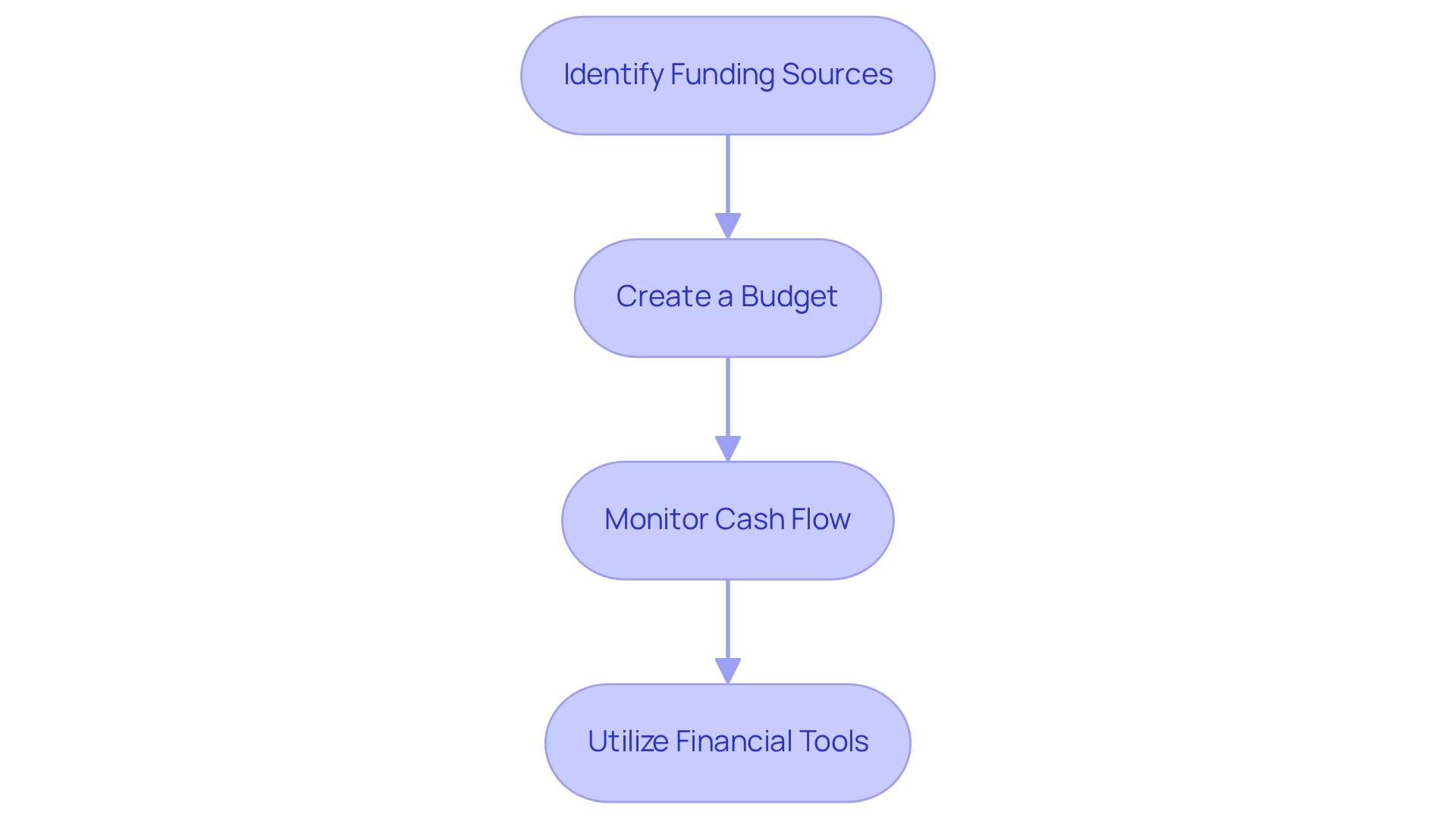
Marketing Your Contracting Business: Strategies for Success
-
Understanding how to start a contracting business can feel overwhelming, especially in today’s digital landscape. We recognize that a professional website is not just a tool; it’s your central hub for showcasing your work, detailing your services, and providing essential contact information. Social media platforms offer a unique opportunity to connect with potential clients and foster a community around your brand. In fact, did you know that 53% of individuals find better recommendations for services through social media? This statistic underscores its effectiveness in reaching a wider audience and enhancing your marketing strategies as a contractor.
-
Networking: Actively participating in local business events and joining industry associations can significantly enhance your networking efforts. Building relationships within your community can lead to valuable referrals and partnerships. We understand that successful builders often leverage these connections to gain insights and opportunities that may not be available through traditional marketing channels.
Content Marketing: Sharing valuable content related to your services, such as informative blog posts or engaging videos, positions you as an authority in your field. This strategy not only attracts potential clients but also illustrates how to start a contracting business that fosters trust and credibility. By consistently providing useful information, you can keep your audience engaged and encourage them to consider your services when the need arises.
-
Customer Reviews: Positive online reviews can greatly enhance your reputation and influence potential clients’ decisions. Encouraging satisfied clients to leave feedback on platforms like Google or Yelp can significantly impact your visibility and credibility. As we look ahead to 2025, the effectiveness of online reviews continues to grow, making it essential for builders to actively manage their online reputation.
Marketing Strategies for Contracting Enterprises: As we progress through 2025, creative marketing approaches are vital for builders to distinguish themselves. This includes utilizing targeted online advertising, optimizing your website for search engines, and engaging in email marketing campaigns. By embracing a diverse strategy, builders can effectively connect with their intended audience, which is crucial when considering how to start a contracting business and stimulate growth.
Examples of Successful Networking Strategies: Successful professionals often share their experiences in networking, emphasizing the importance of follow-ups and maintaining relationships. For instance, attending industry conferences not only provides learning opportunities but also allows for meaningful connections that can lead to future collaborations.
-
Statistics on Online Presence Impact: Recent data shows that businesses with a strong online presence experience higher engagement rates and increased client inquiries. This trend highlights the necessity for builders to invest time and resources into their digital marketing efforts.
Expert Advice on Marketing Strategies: Industry specialists, including Jana, Principal in Deloitte and Touche’s Risk and Financial Advisory practice, suggest that builders concentrate on creating a cohesive brand identity across all platforms. This includes consistent messaging, visual branding, and a clear value proposition that resonates with potential clients. By aligning your marketing strategies with your organizational goals, you can create a compelling narrative that attracts and retains clients.
Furthermore, as contractors navigate the complexities of the industry, it is crucial to adjust to evolving dynamics, as emphasized in the case study on traditional studios, which highlights the necessity for investment in technology and strategic alliances. Furthermore, maintaining effective communication channels, as illustrated by the recent issue with the subscription form for Community Memo, is essential for fostering client relationships.
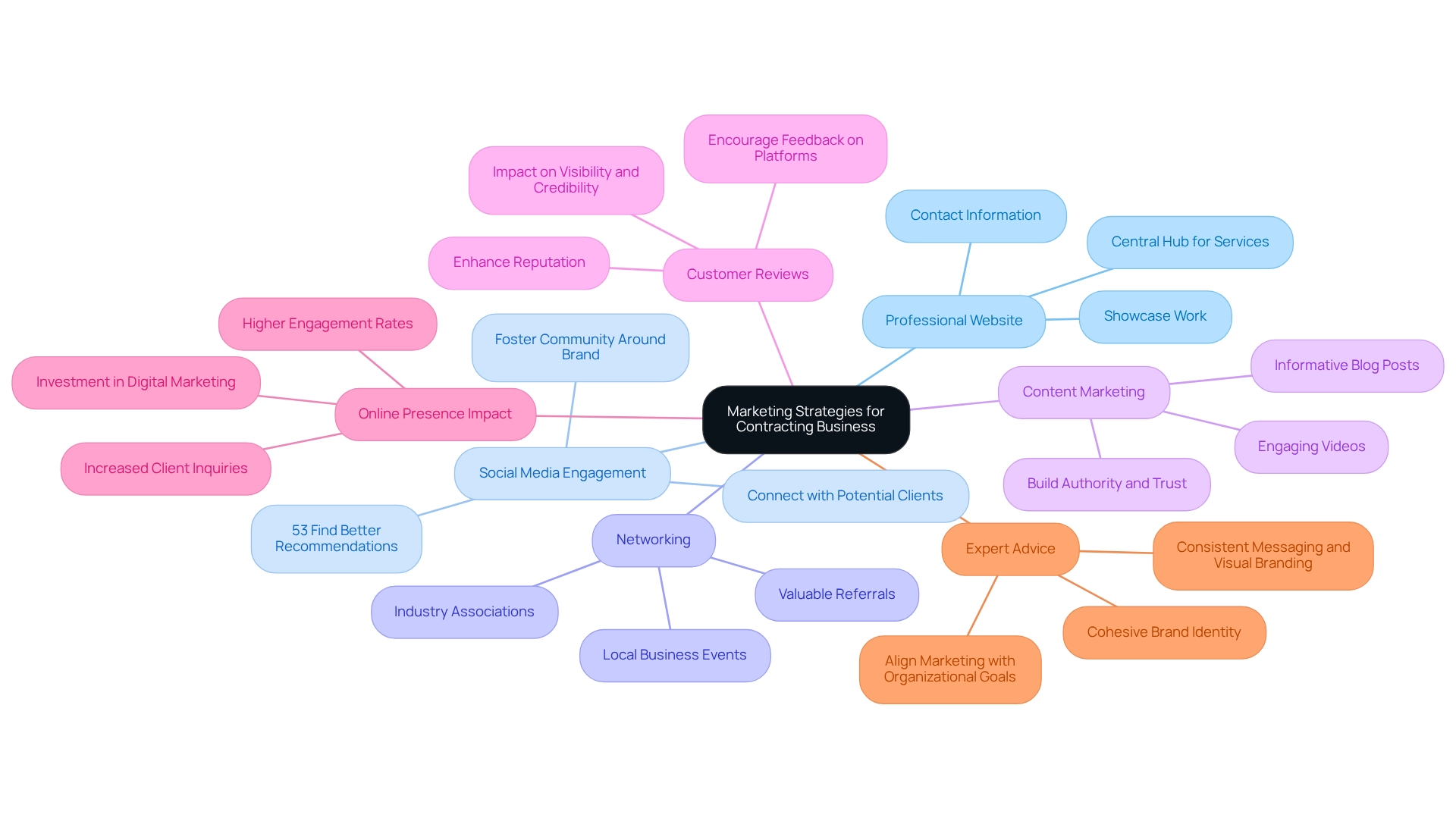
Building Your Team: Hiring and Managing Employees and Subcontractors
-
Define Roles and Responsibilities: Understanding the importance of clear roles and responsibilities is essential for your business’s success. Each team member deserves to know their specific duties, which not only enhances accountability but also streamlines operations. This clarity helps prevent overlaps and gaps, ensuring that projects run smoothly. As Kate Hardin, Executive Director, shares, defining roles is crucial for nurturing a productive work environment. We understand that this can be challenging, but with the right approach, you can create a supportive atmosphere.
-
Recruitment: Building a strong team requires leveraging various recruitment channels like job boards, social media, and professional networking events. In 2025, hiring trends in the construction sector reveal a growing demand for skilled labor, with market forecasts predicting growth to $28.6 billion by 2029. This makes it vital to adopt effective recruitment strategies. Have you considered utilizing targeted advertisements or engaging with local trade schools? These methods can help attract qualified candidates and foster a sense of community.
-
Training and Development: Investing in employee training is not just beneficial; it’s vital for maintaining a competitive edge in the contracting sector. Statistics show that organizations allocating resources to training programs often see significant returns, including improved employee performance and retention rates. By providing ongoing development opportunities, you equip your team with essential skills while fostering loyalty and job satisfaction. Remember, you are not alone in this journey—supporting your team is a shared goal.
-
Performance Management: A robust performance management system is essential for evaluating employee contributions and providing constructive feedback. Regular performance reviews can help identify areas for improvement while recognizing outstanding work, promoting a culture of growth and accountability. As the construction sector evolves, driven by government investments and technological advancements, having a skilled and adaptable workforce becomes increasingly important. The case study titled “Government Investment Impact on Construction” illustrates how these investments drive growth, emphasizing the need for a skilled workforce to seize opportunities. Together, we can navigate these changes and empower your team.
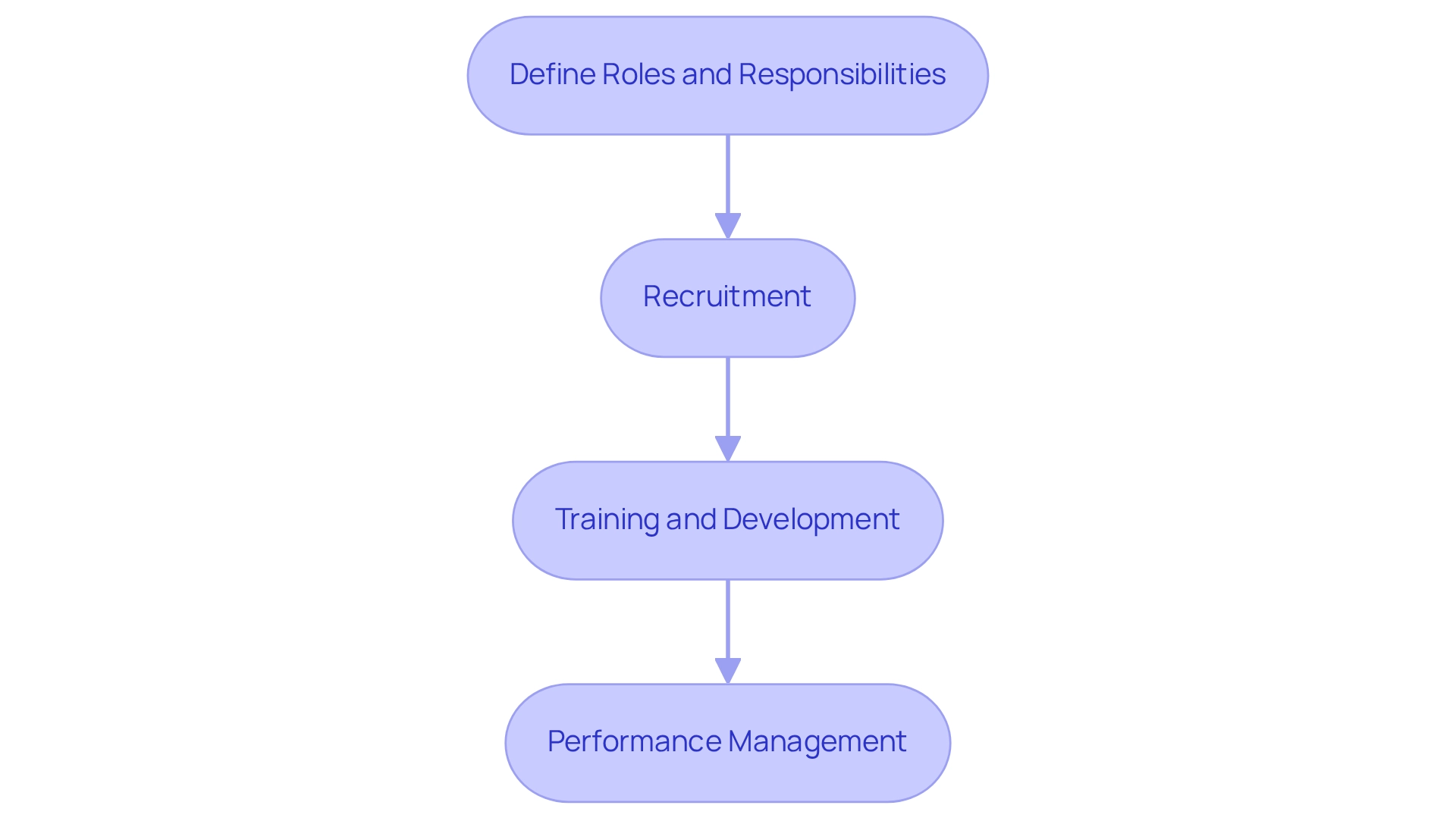
Continuous Learning and Adaptation: Staying Competitive in Contracting
-
Invest in Professional Development: We understand that actively participating in workshops, seminars, and courses is essential for individuals like you who aim to enhance their skills and knowledge. With 87% of learning and development professionals emphasizing the importance of fostering a growth mindset, investing in your professional development not only equips you with the latest industry skills but also positions you as a leader in your field. Did you know that employees learn 70% of their skills on the job and just 10% through formal training? This highlights the immense value of practical experience. As we look toward 2025, those who prioritize ongoing education are more likely to gain competitive advantages in a rapidly evolving market, ultimately contributing to their financial independence and career longevity. This proactive approach is crucial in a landscape where conventional career options are limited, and the ability to adapt is essential for long-term employability.
-
Stay Informed: It’s vital to keep abreast of industry publications and join professional organizations, especially for contractors. Engaging with these resources allows you to remain informed about trends and best practices that can greatly influence your enterprise. A recent survey showed that 54% of employees are actively looking for leadership training opportunities. This reinforces the need for knowledge that can promote career advancement and organizational success. By staying informed through industry publications and professional organizations, you enhance your community engagement and support network. Remember, by managing your professional growth, you can navigate the challenges of employability in a diminishing job landscape.
-
Adapt to Changes: The contracting environment is dynamic, and being open to modifying your strategies based on feedback and emerging opportunities is vital. Contractors who embrace change and continuously refine their approaches are better positioned to thrive. As noted by Valamis, 16.9% of companies worldwide utilize a learning management system, illustrating how organizations leverage technology for continuous learning. This adaptability not only enhances resilience but also fosters innovation, ensuring that your organization remains relevant in a competitive environment. Embracing change is a key factor in taking control of your destiny and achieving financial freedom.
-
Encourage Team Learning: Cultivating a culture of continuous learning within your team can significantly improve overall performance and adaptability. A positive employee experience is linked to effective training goals, with 92% of survey respondents believing that such goals should focus on diversity, engagement, and a growth mindset. The case study titled “Positive Employee Experience through Training Goals” highlights that aligning training objectives with enhancing employee experience fosters a more inclusive and engaged workforce. By investing in your team’s development, you not only enhance their skills but also drive your business’s success, empowering them to contribute to your shared goals of financial freedom and community impact. This collective effort is vital in a career landscape where opportunities for wealth and equity building are increasingly limited.
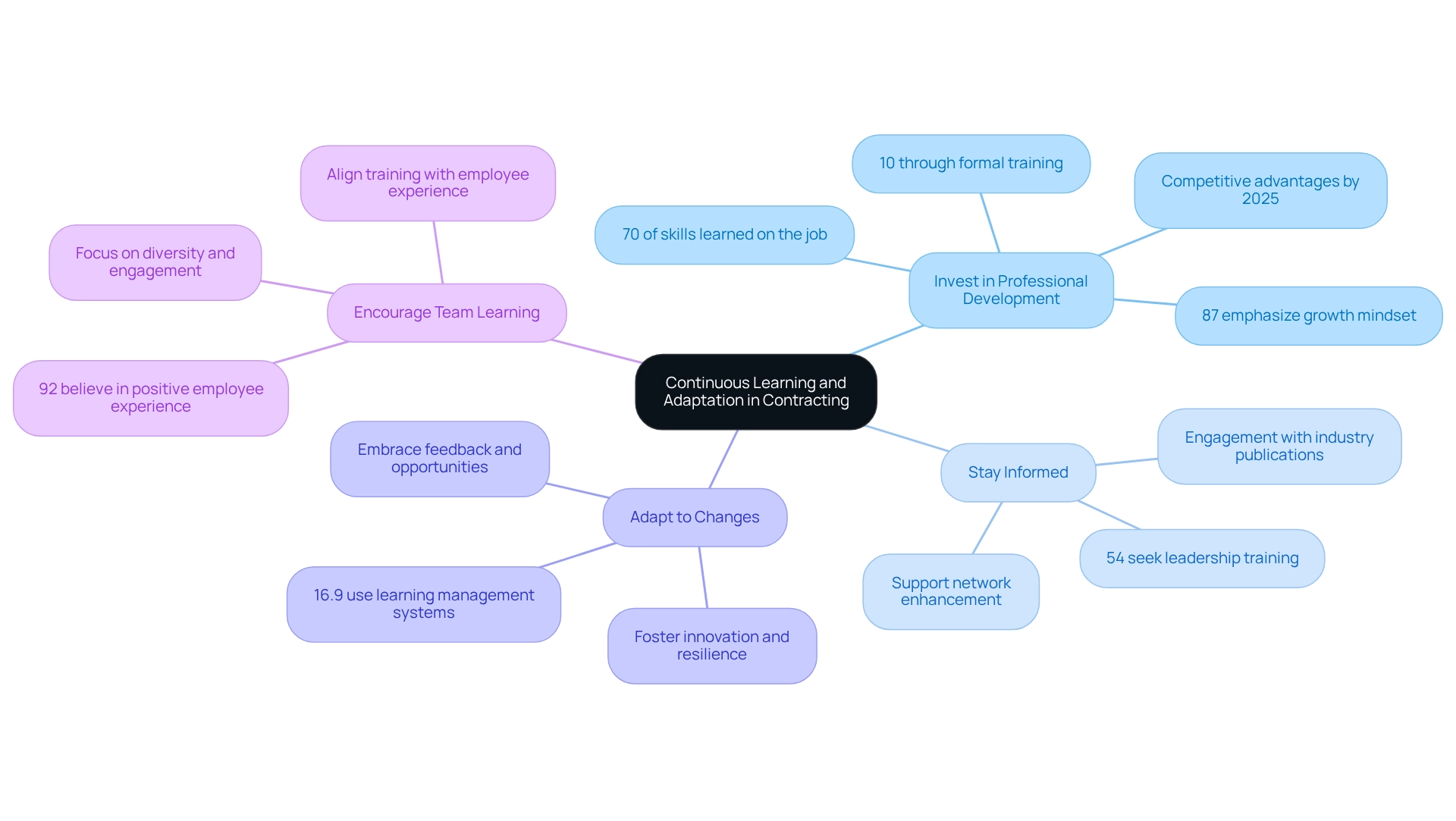
Conclusion
Launching a successful contracting business can feel overwhelming, and you’re not alone in facing these challenges. It requires a multifaceted approach that integrates strategic planning, market understanding, and effective execution. Identifying a niche that aligns with your skills and market demand is a crucial first step. By creating a solid business structure and conducting thorough market research, you can gain insights into local dynamics and customer preferences that will guide your journey.
Financial management is another area where many struggle, yet it plays a vital role in sustaining your business operations. By identifying diverse funding sources, creating detailed budgets, and monitoring cash flow, you can maintain financial health and make informed decisions. Remember, building a strong online presence and engaging in effective marketing strategies can significantly enhance your visibility and help you attract clients.
As the construction industry evolves, embracing continuous learning and adaptation is essential for long-term success. We understand that investing in professional development and staying informed about industry trends can feel daunting. However, fostering a culture of learning within your team can empower you to remain competitive. By integrating these practices, you can transform your ambitions into a thriving business that not only meets the needs of today’s market but also positions you for future growth and sustainability. The journey may be challenging, but with the right tools and insights, success is well within your reach. You have the power to take action and shape your career ownership.
Frequently Asked Questions
Why is it important to identify a niche in the contracting business?
Identifying a niche is crucial as it aligns your skills with market demand, allowing you to customize your services and marketing approaches effectively. This helps you stand out in a competitive field and is essential for success in the industry.
What are the different legal structures I can choose for my contracting business?
You can consider various legal structures such as sole proprietorship, limited liability company (LLC), or corporation. Each option has distinct legal and tax implications, so it’s important to evaluate which structure best suits your objectives and risk tolerance.
How can I choose a memorable business name?
Selecting a memorable name involves ensuring it encapsulates your services and resonates with your target audience. It’s important to check local enterprise registries to confirm the name’s uniqueness and avoid potential legal issues.
What steps do I need to take to register my company?
You need to complete the necessary paperwork to legally register your company with local and state authorities, which may include obtaining specific licenses or permits depending on your niche.
Why should I establish a separate financial account for my contracting business?
Opening a dedicated bank account helps maintain a clear separation between personal and professional finances, simplifies accounting, and enhances your professional image. It also provides financial flexibility to manage initial expenses effectively.
What are some current trends in the contracting industry?
Current trends include the increasing adoption of modular and prefabricated construction methods, which can lead to faster project completion times. Additionally, there is a growing demand for sustainable and energy-efficient solutions, reflecting a broader shift towards Environmental, Social, and Governance (ESG) principles.
How can I identify my target market?
To identify your target market, consider key demographics such as age, income level, homeownership status, geographic location, and specific needs. Understanding these factors will shape your marketing strategies effectively.
What should I analyze when researching competitors?
When analyzing competitors, research their service offerings, pricing structures, and customer feedback to identify gaps in the industry. This will help you find unique value propositions or specialized services that can set you apart.
How can I gather data on customer preferences?
You can collect data through surveys and interviews to gain insights from potential clients, as well as utilize online resources and industry reports for valuable context on customer preferences and industry trends.
Why is it essential to evaluate demand for my services?
Evaluating demand is crucial as it helps you understand local construction projects and economic indicators. Staying informed about trends, such as the adoption of innovative practices like Building Information Modeling (BIM), allows you to position your enterprise to meet the evolving needs of your target market effectively.


